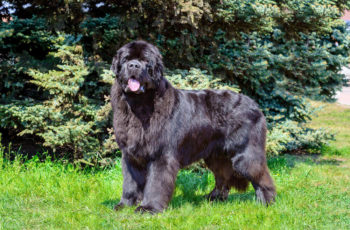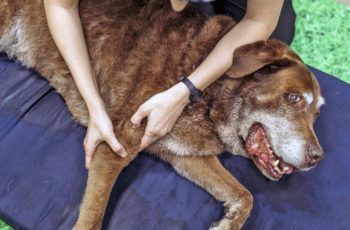For those humans who still have them, tonsils and adenoids – while they do serve a purpose – can be very troublesome. While they are both bodily components designed by nature to protect against infection, when they lose that fight, the resulting infection can be miserably painful.
But what about dogs? Do dogs have tonsils? Might they suffer in the same way?
Do Dogs Have Tonsils? And Adenoids?
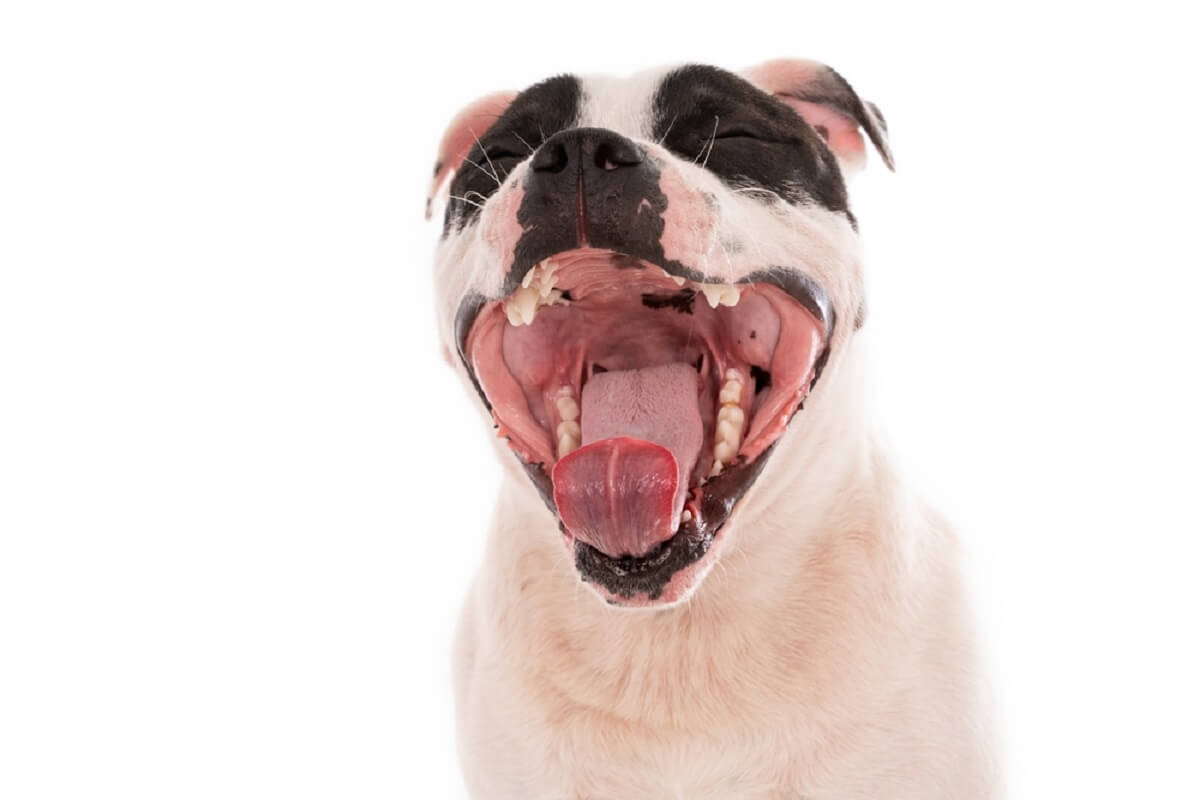
Dogs do indeed have tonsils. And, just like humans, they have two of them. The tonsils are positioned in the back of the dog’s throat in little pouches called crypts. They may expand as a result of inflammation or infection when battling infection.
Tonsils that are swollen and red will appear to burst out of their crypts and can be seen fairly easily in the back of the throat. To determine if your pup has swollen tonsils, you should be able to shine a light in their mouth and see the problem quickly, just as you might for a human child.
It is believed that tonsils serve the same purpose as they do in humans, and seem to do a better job, as tonsillitis is far less common in canines than it is in their human companions.
In fact, tonsillitis is very uncommon in dogs and when it does occur it is usually seen in smaller breeds.
Dogs also have adenoids.
Adenoids, in both dogs and humans, are a small piece of tissue located at the very end of the nasal passage. Like tonsils, their purpose is to try to keep out bacteria and prevent infection. And, like tonsils, if they fail to do that the result can be a painful infection. The instance of this is, once again, far rarer in dogs than it is in humans.
Can Dogs Get Tonsillitis?
For some humans, especially in childhood, tonsillitis can become an annual problem that may eventually lead to the need for a tonsillectomy, the safe removal of the tonsils. While, as we mentioned, its occurrence is far less frequent in pups, dogs can get tonsillitis.
In dogs, it is usually a secondary, rather than a primary issue, one that occurs as a result of some other health issue that will need to be addressed as well.
However, you do not need to worry about keeping a sad, sick child away from their furry friend if they have tonsillitis as dogs cannot ‘catch’ it from them. The bacteria that cause tonsillitis in humans and those that cause it in pups are different.
Where some people get very confused is when discussing tonsillitis and what is often termed strep throat. The two terms are frequently used around the Internet, and in general conversation, as if they are interchangeable, but that is not the case at all, as we will take a closer look at next.
One known cause of tonsillitis in dogs is poor dental hygiene that results in a gum or tooth infection that then spreads to the tonsils.
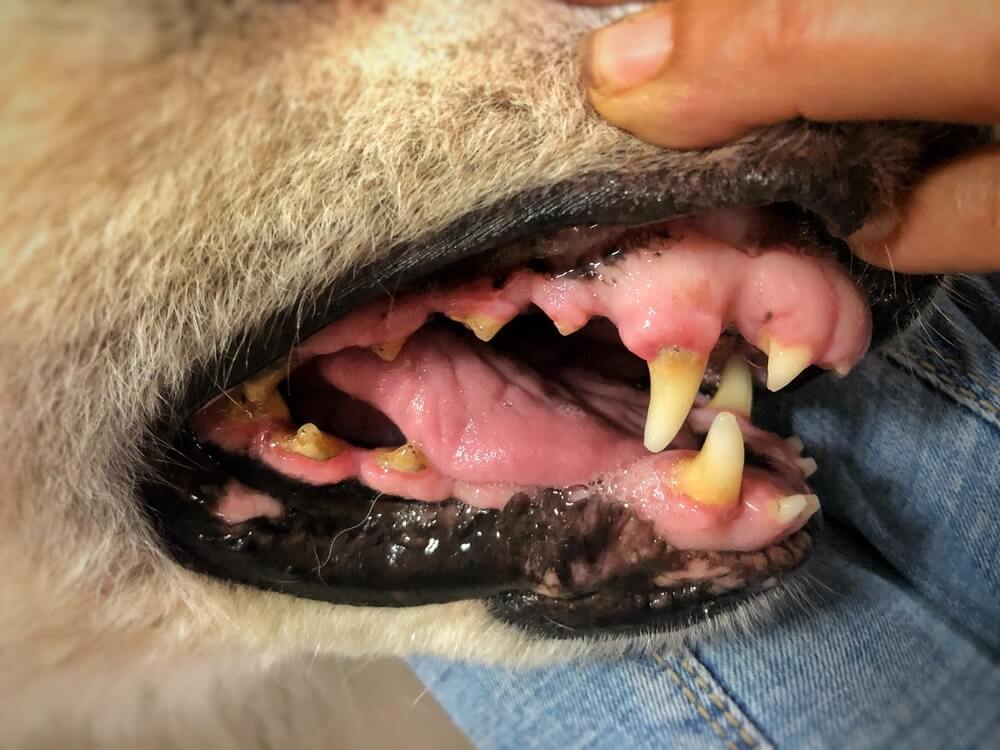
According to VCA Hospitals:
The main cause of chronic disease in the mouth is tartar accumulation on the teeth and the bacterial infections associated with it (periodontal disease).
This can occasionally be true for humans too, but most of us are far more careful with our own dental health than we sometimes are with that of our dogs. However, preventing tonsil problems is one of the many reasons that a dog’s dental health is as important as our own.
Keep your dogs teeth clean with these ten tips for better dental health in dogs.
Other issues, health issues that should only be treated by your vet, that may lead to secondary tonsillitis can include frequent vomiting and certain cancers. While dogs can’t tell you they have a throat, they may show you, by eating less, drinking more or whining.
The most important element in dental care for your dog is daily brushing.
If you’ve recently adopted a senior dog, get your vet to check what the condition of the dog’s teeth and gums are. Unfortunately, many senior dogs haven’t had the benefit of good dental care and many can suffer from periodontal, or gum disease.
Can Dogs Get Strep Throat?
Yes, dogs can get strep throat, and no, it is not the same thing as tonsillitis, either in pups or in humans. As a pet – and/or human parent, it’s very helpful to understand the difference.
Tonsillitis is a condition in which the tonsils become inflamed.
Streptococcus pyogenes causes strep throat, and it is a specific type of bacterium. The tonsils are normally quite inflamed when your dog or child has strep throat, and the inflammation may spread to the rest of the throat, but it is a separate and different condition.
Viruses such as the common cold or many strains of flu can also cause sore throats, but they just irritate the throat all around the tonsils, not the tonsils themselves.
The treatments are different too. In the case of tonsillitis or strep throat the infections won’t just go away by themselves, a course of antibiotics will be needed. Antibiotics are used to treat infections, not viruses, and in the case of a virus these will need to resolve by themselves and the prescription of antibiotics would be an abuse of these crucial drugs and be of no help anyway.
This is the reason why, if you take your human child to a pediatrician, or you go to a doctor yourself, a throat culture will be taken to properly diagnose any throat problems before antibiotics are prescribed, and your vet will do the same.
In some very rare cases, it is believed that strep throat has been spread from a human to a pup, but this happens so rarely that statistically the instance would be zero, so once again you don’t have to quarantine yourself or your kids away from the comfort of your furry friend if you have strep throat.
Dogs can, however, spread strep throat to one another, via saliva, so an infected pup should not share their water or food dish with other pups until they are better.
Can Dogs Have Tonsils Removed?
A tonsillectomy for dogs is possible, but it is a rare procedure. Such operations are only considered for humans in the case of severe, frequently recurring bouts of tonsillitis. Removing the tonsils takes away a layer of natural infection prevention for life, so it’s not something done lightly. This is true of canines too.
Were it considered necessary for a dog to have their tonsils removed, it would need to be a procedure carried out by an ENT specialist, just as it would be in humans.
Keeping Your Pup’s Mouth Safe From Bacteria
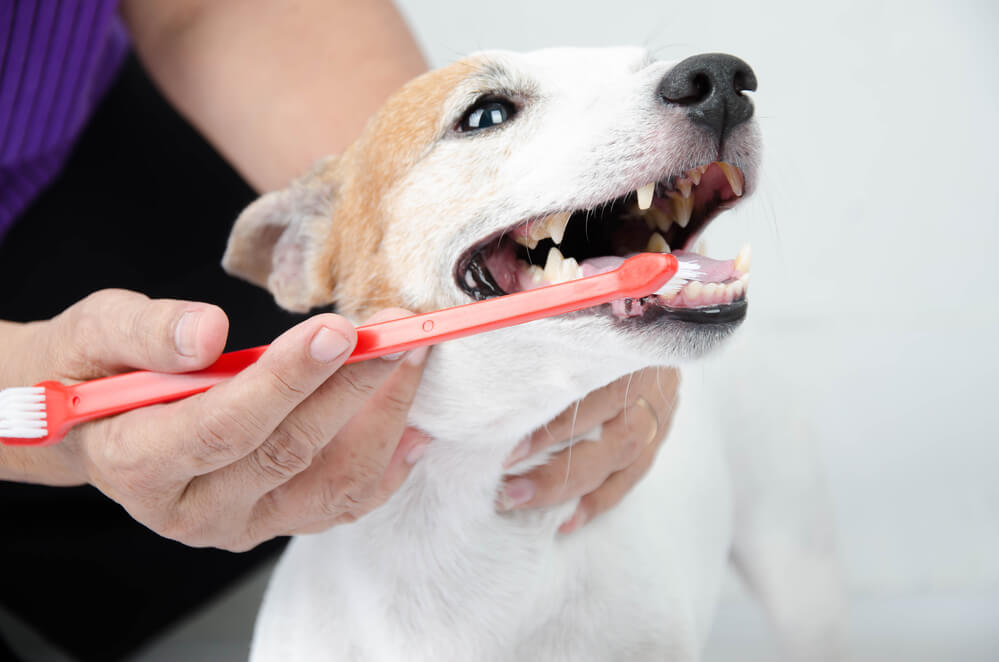
As we mentioned earlier, while tonsillitis is rare in dogs, if and when it is seen it is most often the result of poor dental health. Many pet parents do not take the best care of their dog’s teeth and gums because doing so can be very difficult, especially if theirs is a larger pup who will put up a serious fight if a toothbrush is randomly inserted into their mouth (or eat the toothbrush.)
However, as dental health is so important for dogs – the secondary infections caused by infected teeth and gums in dogs can do much more harm than inflame the tonsils – it is something all pet parents should learn to do properly and be as diligent about as they are for themselves. A professional dental cleaning for your pet can be a costly procedure.
Here’s a YouTube video showing how one veterinarian recommends you do it.
Never use human toothpaste, as it may contain ingredients that are harmless to us but toxic for your pup. Choose a canine specific dog toothpaste and try to get into the habit of brushing your dog’s teeth at least once a week.
The doggie toothpaste should contain chlorhexidine to be effective. Beef- or chicken-flavored toothpaste will make your dog think he is getting a treat. Doggie toothpaste, toothbrushes, and other devices for at-home teeth cleaning are widely available, here are some of our favorites.
Virbac CET Enzymatic Toothpase for Dogs and Cats

This doggie toothpaste provides natural antibacterial action to help prevent the formation of plaque in your pup’s mouth, as well as get rid of mouth odors. There are no foaming agents to worry about, which makes this product safe for your dog to ingest!
View on Amazon \ View on Chewy
Petrodex Natural Toothpaste Dog (Peanut Flavored)
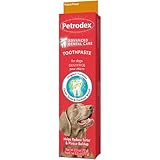
This all-natural doggie toothpaste from Sentry is peanut flavored and helps clean teeth, freshens breath and reduce tartar and plaque buildup in dogs. There are no artificial preservatives or additives so it’s safe if your pup ingests some of it.
View on Amazon \ View on Chewy
You can also buy special dog treats that help keep your pup’s teeth clean between brushes, and these also have the added benefit of helping keep your dog’s breath a little fresher. Here some of our favorites.
Blue Buffalo Dental Chews

This tasty and highly digestible dental chews are made from all-natural blend of ingredients to help fresh your dog’s breath and make her teeth sparkle, another bonus is that they are fortified with glucosamine and chondroitin to help with joint support.
View on Amazon \ View on Chewy
Greenies Original Dental Dog Treats

This classic popular dental treat beloved by many owners and dogs who try them is vet-approved and has a unique bristle crevice design to fight plaque and tartar as well as freshen his breath.
View on Amazon \ View on Chewy
Ensuring that they have access at all times to lots of clean water will help as well.
Other great reads you’ll enjoy:
If you are concerned about your pet, visit or call your veterinarian – he/she is your best resource to ensure the health and well-being of your dog. This information is for informational purposes only and is not meant as a substitute for the professional advice of, or diagnosis or treatment by, your veterinarian with respect to your pet.
Like this? SUBSCRIBE for great reads and canine tips!
Join our free mailing list for: Giveaways + Deals + Exclusive Content + Sneak Peeks, Reviews + More

